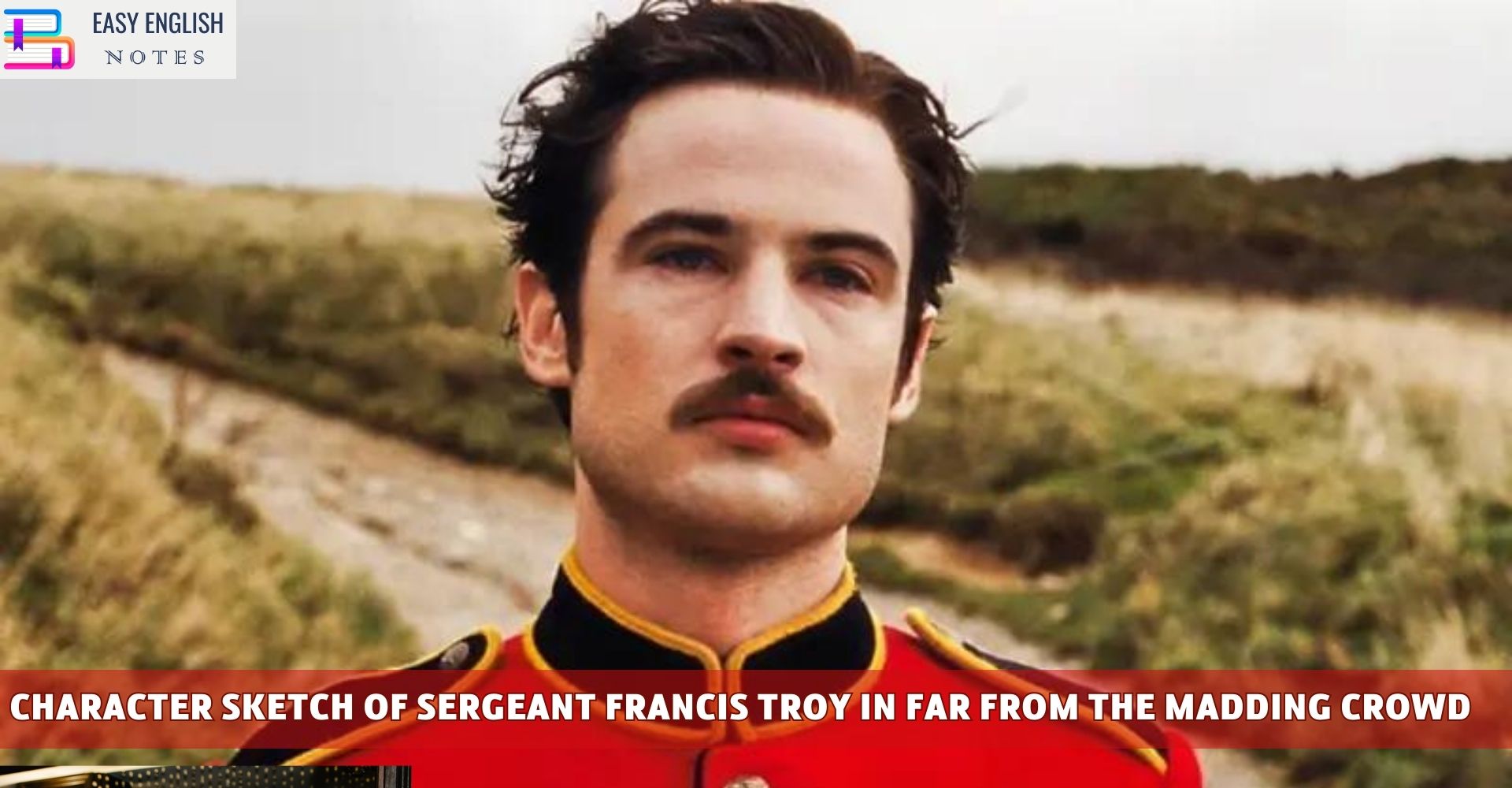Sergeant Francis Troy is one of the central characters in Thomas Hardy’s novel “Far From the Madding Crowd.” He is a complex and enigmatic character whose presence in the story adds layers of intrigue, passion, and tragedy. Sergeant Troy’s character is a mixture of charm, recklessness, and self-destructiveness, making him both captivating and flawed.
Sergeant Francis Troy is a former soldier who served in the British army. He left his military career to pursue a life in farming, eventually inheriting a substantial piece of land and a comfortable income. Despite his newfound wealth, Troy remains somewhat restless and discontented.
Troy is also a very important character in the novel. He is quite exceptional in the sense that he never cares for the past and the future. He lives in the present and does not have any prickings of conscience.
In the beginning of his career, he was a clerk. Then he joined the Army.and later on he began his love affairs with Fanny. Out of his cleverness, and tricks, he was able to attract the attention of Bathsheba towards himself.
Cyril Aldred has drawn a very cryptic portrait of Sergeant Troy in the following words:
“There could be no greater foil to the slow, chaste, inarticulate Boldwood than the dashing, philandering, confident Troy who finds artistic pleasure in expressing a feeling on the spur of the moment. His deformities deep down from a woman’s vision whilst his embellishments were upon the very surface. His superficiality is in fact his charm – the quality one demands on a long train journey of fellow passengers who are not likely to be seen again. He is purely a sensualist; yet a man who can practise sword strokes with such adroitness, who can stand calmly before a sniggering congregation waiting for the bride who never comes and who is also able to perform riding feats as a circus turn cannot but achieve glamour. He seems at first to have been well- intentioned towards Fanny, and there is in his spurning of Boldwood’s financial overtures, something of the hauteur of his noble ancestry. While Troy may not win admiration, he does not arouse dislike.”
Troy is a man of impulse. He has no conscience, or sense of good or evil. His one purpose is to indulge in sensual pleasures. He can tell lies to women without any hesitation. Because he believes that without telling lies he can never win the heart of women. He is successful in marrying Bathsheba by displaying his passionate love for her.
Also Read :
- Compare Hamlet with Macbeth, Othello and other Tragedies
- “The Pardoner’s Tale” is the finest tale of Chaucer
- Prologue to Canterbury Tales – (Short Ques & Ans)
- Confessional Poetry – Definition & meaning
- Line By Line Explanation Of The Poem The Eve of St. Agnes
Outwardly Troy is quite cultured and polished. His clean dress and amiable manners are the greatest weapons for winning women. We can see the magical effect of his dress and manners of Bathsheba. He is superior to Boldwood in this respect. Troy is apparently very talkative and clever but he cannot combine the action with wisdom. About this Hardy has very convincingly said:
“Troy was full of activity but his activities were less of locomotive than a vegetative nature; and never being based upon any original choice of foundation or direction, they were exercised upon whatever object chance might place in their way. Hence, whilst he sometimes reached the brilliance in speech because that was spontaneous, he fell below the commonplace in action, from inability to guide incipient effort. He had a quick comprehension and considerable force of character; but being without the power to combine them the comprehension became engaged with trivialities.
Personality Traits:
- Charismatic and Charming: Troy possesses an innate charm that draws people to him effortlessly. He has a magnetic personality that makes it easy for him to win the affection and admiration of those around him.
- Impulsive and Reckless: One of Troy’s defining characteristics is his impulsiveness and recklessness. He often acts on whims and desires without considering the consequences. This impulsive nature leads to several critical decisions and events in the story.
- Flirtatious and Romantic: Troy is a romantic at heart and is known for his flirtatious behavior. His initial courtship of Bathsheba is filled with passionate declarations of love and extravagant gestures.
- Manipulative: While Troy appears genuine and romantic, he can also be manipulative. He hides certain aspects of his past and personality to maintain a particular image. His manipulative tendencies become evident as the story unfolds.
- Self-Destructive: Troy’s character is marked by self-destructive tendencies. He indulges in vices, such as gambling and extravagance, which lead to his downfall. His inability to control his impulses contributes to his tragic fate.
Role in the Novel:
Sergeant Troy’s arrival in Weatherbury disrupts the lives of the other characters, particularly Bathsheba Everdene. He plays a significant role in the romantic entanglements and conflicts that drive the novel’s plot.
Initially, Troy’s character embodies the idea of passionate and impulsive love. He wins Bathsheba’s heart with his charisma and romantic gestures, leading to their marriage. However, as the story progresses, his darker qualities come to the forefront, and his reckless behavior threatens to unravel the lives of those around him.
Troy’s character also serves as a foil to Gabriel Oak, highlighting the contrast between their temperaments and values. While Gabriel represents stability, loyalty, and patience, Troy embodies volatility, deceit, and impulsiveness.
In summary, Sergeant Francis Troy is a multifaceted character in Thomas Hardy’s novel, embodying qualities of charm, impulsiveness, and self-destruction. His character serves as a catalyst for the novel’s events and themes, offering a complex portrayal of love and human nature.
PLEASE HELP ME TO REACH 1000 SUBSCRIBER ON MY COOKING YT CHANNEL (CLICK HERE)











